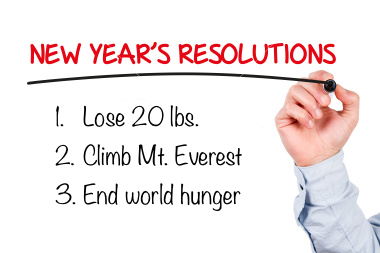 Ahhh, January! The month of good intentions.
Ahhh, January! The month of good intentions.
The month of diets begun and gym memberships opened, vices sworn off and new beginnings envisioned.
And now, one week in, it may well be the month of “I’ll start over next week.”
If you’re looking to make changes—and to actually succeed—I suggest you start small.
Most of us tend to think in all or nothing terms, losing sight of the many tiny changes that contribute to success and the many failures that go into finally getting some traction.
I think of change as, say, fifty percent failure, with the other fifty percent consisting of false starts and corrections and a handful of wins.
Change doesn’t happen in one swoop, no matter what the Just Do It campaign implies. An intention to be more patient with our children or kinder to our spouse is a mere starting point. In order to take it from the idea stage to the action stage, we have to break it down into small, well-thought-out, doable steps. Steps that we’re nearly guaranteed to pull off.
One New Year’s Eve, I heard a comedienne say, “I’m tired of making New Year’s resolutions that I cannot keep. This year I’ve got one that’s a sure-fire win. This year, I resolve not to stab anyone.”
Aiming just a bit higher than that, one might say, “this year I’m going to become more physically fit,” and start with standing when you talk on the phone instead of sitting with your feet up, parking three blocks away from the office or the train station, doing five sit-ups a day.
Remember, five sit-ups is five sit-ups more than having sat on your duff. No, that and an extra flight or two of stairs won’t get you on the cover of Flex magazine, but it is a small first step that you can build on if you choose.
It used to be that doing something one hundred percent was as good as it got. Apparently that’s now no longer enough. Every day I hear people say “we went for it a hundred-and-ten percent,” or “a thousand percent” leaving the hundred-percenters to look like mere slackers.
How about we give credit to every small move we make that brings us closer to our goal? If one out of four times you’re patient instead of brusque, if every day you do one kind thing  for your spouse that you wouldn’t normally do, I say “thumbs up.” Maybe tomorrow you’ll do two kind things or four; maybe you’ll surprise yourself and do five. Maybe you’ll have a bad day and be as grouchy or stingy as ever.
for your spouse that you wouldn’t normally do, I say “thumbs up.” Maybe tomorrow you’ll do two kind things or four; maybe you’ll surprise yourself and do five. Maybe you’ll have a bad day and be as grouchy or stingy as ever.
But then again, maybe not.
Not hitting the mark? Okay, dust yourself off and go at it again. Humans are flawed creatures who do not change easily. Though many a New Year’s resolution has bitten the dust with the very first obstacle that it encountered, the truth is that one cookie or grumpy outburst does not a full-on failure make.
No matter how focused and determined we are, familiar patterns are difficult to break. Often, change occurs when we are about to behave in the habitual way and we stop ourselves in midstream. Much like the do-over concept I wrote about in a recent post, where couples give themselves a second chance after having behaved in a regrettable way.
Thinking big is the real enemy of change. Yes, people like to say “you can’t cross a chasm in two small jumps,” but the truth is that most of the changes that will make the biggest difference in our relationships require small, repeated shifts in behavior.
For example, a resolution to stop interrupting your partner when she’s talking is really a commitment to be aware of the impact of the offending behavior, to pause, to calm down, to be silent, to listen, to be mindful of a tendency to be competitive or dismissive, and to manage your impulse to correct “misinformation”.
When setting goals keep these principles in mind:
1. Start with a goal that is manageable and measurable.
2. Be clear about the new behavior you aspire to and know all the small pieces that comprise the whole.
3. Don’t underestimate how challenging it can be to adopt new behaviors.
4. Remember that mistakes are a helpful part of the learning process.
5. Accept imperfection as an inevitability.
6. Don’t get so focused on your failures that you give up.
7. Aim as high as possible, but not so high that you set yourself up to fail.
Now over to you: What’s helped you make positive changes in your life?
______________________________________________________
Please share this post with others!
Sign up to get your FREE Speaking of Marriage Gift Pack: 75 Ways To Improve Your Relationship Starting Today— plus weekly blog posts delivered straight to your inbox.
Check out my Facebook page for cartoons, quotes, articles of interest and more!
As always, great advice. Divide and conquer.
LikeLike
Ha! At first I didn’t get what you meant.
Clever, and so true. 🙂
LikeLike
We military guys always try to make things sound more cerebral than they really are. Baby steps, divide and conquer, fairly similar.
LikeLike
Right on, Winifred! One small step at a time!
LikeLike
Thanks, Jan.
LikeLike
I love Number one and I’m sticking with it. I can safely say I agree with the comedienne, I resolve to not stabbing anyone this year;lol
That is proper divide and conquer Navigator 🙂 lol
LikeLike
Yes. I’m not going to stab anyone either. 🙂
LikeLike
lol…
LikeLike
I think #4 is so important. A yoga teacher I studied with used to say, “Confusion is good. It means that you’re learning.” Making mistakes is part of that confusion. If you don’t allow yourself to keep practicing a new behavior or way of thinking, how are you supposed to learn to get it right? Thanks as always for sharing your wisdom and best wishes to you in the New Year!
LikeLike
We’re all so focused on success that we can miss how important mistakes can be. I like the idea of valuing confusion as well. Certainly a necessary component of clarity.
Happy New Year to you as well.
LikeLike
I just took this advice recently: it’s always easier to add something than to take away, as taking away or “stopping something” is like punishment. Adding something to boost confidence, such as drinking one green juice a day, can really build confidence for other, tougher goals like quitting smoking.
Great post!!
LikeLike
I agree- adding is easier that subtracting because it eliminates the element of deprivation, or as you say, punishment.
I hadn’t thought of it in those terms. Thanks so much for sharing this.
LikeLike
This reminds me of how important it is to support someone who is making changes, even when — perhaps especially when — the changes are happening in small increments. People are sometimes incredibly stingy with encouragement, taking an all-or-nothing attitude and withholding praise unless someone has already succeeded 100%. It’s important to show that you notice and appreciate the attempts and the small steps that happen along the way. Otherwise the other person may feel that his or her efforts are unnoticed and futile.
LikeLike
Nice addition. Thanks, Rosemary.
LikeLike
Reassuring to read about being realistic with our New Year’s “resolutions.”
I was actually preparing a blog post for this week about a small change I am making and if it’s okay with you I will link to your post.
Cheers!
LikeLike
Please- always feel free to link to my posts.
Too often we undervalue our small changes when they are central to any sustainable change we make. I’ll look forward to your post.
By the way, with my wobbly French, I sometimes have a go at reading your French posts, too. Ambitious that you write both. And fun for me.
LikeLike
Thank you! I will post it tonight. And I love it that you read me in both languages.
LikeLike
Thank you for reminding me to follow what I already know. Getting to caught up in the ending instead of the beginning.
LikeLike
Great way to put it!
Yes, we get focused on the end. Exactly. The beginning is really the key, isn’t it?
LikeLike
Yes it is the most important part but I keep forgetting, wonderful blog.
LikeLike
Thanks.
LikeLike
Pingback: What Is Your Small Change for 2014? – Evelyne Holingue
I totally agree with the Theory of Baby Steps. Currently, I’m trying to finish a writing project and I set the bar very, very low, like getting my name and the date on the page. Then I always end up writing say, 400 words in one sitting, and at the end I praise myself lavishly, out loud (even when I’m alone, like a crazy woman) for my achievement.
LikeLike
Love the talking out loud piece. Very nice.
I one suggested someone start exercising by walking 5 minutes. Same idea.
LikeLike
Great advice – I would say more than that: another instance of blogging excellence from you. So… here is an award that I hope will bring more people in touch with your insightful work on relationships: http://shardsofsilence.wordpress.com/2014/01/10/shauny-award-blogging-excellence/
LikeLike
You’re a dear and such a great support.
I’ll do my best to get to this in the next day of so.
Again, much gratitude, Vic.
LikeLike
🙂 All the best. Hope you have a great start to the week.
LikeLike